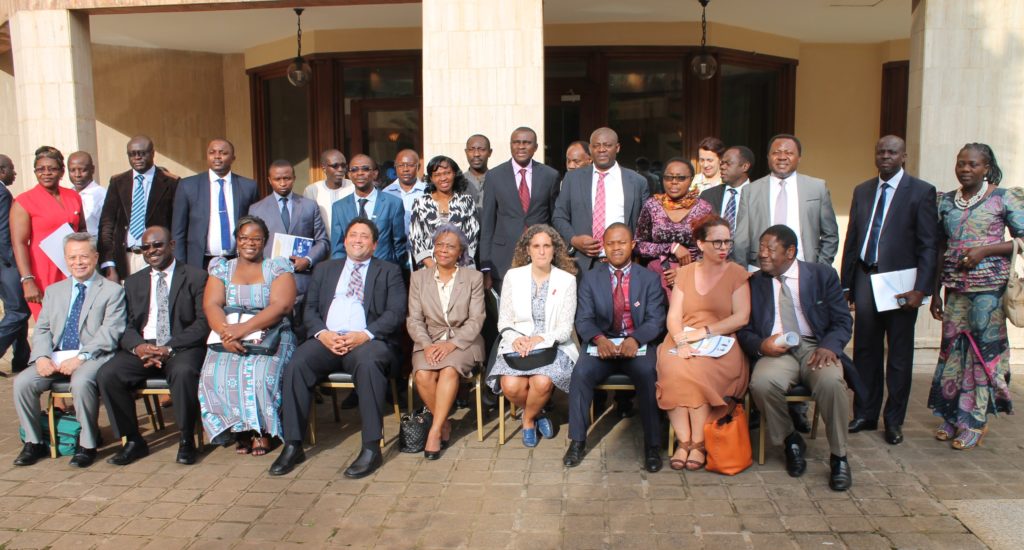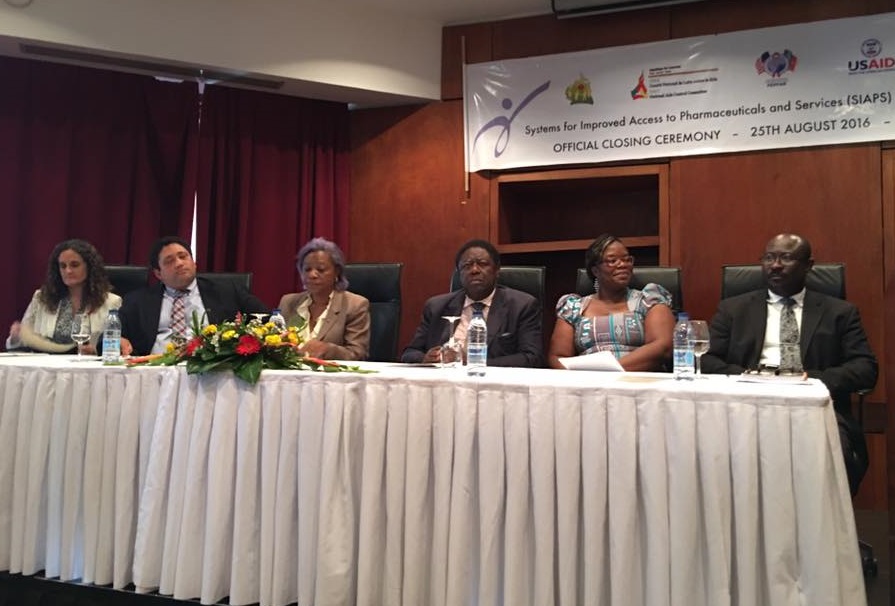SIAPS Cameroon’s Closing Ceremony Event took place on the 25th of August 2016 in Yaoundé. It was chaired by the Permanent Secretary of the Ministry of Health, Profesor Koulla-Shiro, and accompanied by the General Inspector of the Ministry of Health, Professeur Biwole Sida, the US Embassy Deputy Chief of Mission, Mr. David Brownstein, the Permanent Secretary of the National AIDS Control Committee, Dr. Jean-Bosco Elat, and USAID Country Program Coordinator, Ms. Aisatou Ngong.
 Belen Tarrafeta, SIAPS Cameroon Country Project Director, presented the achievements of SIAPS in reducing antiretroviral medicines (ARV) stock-out in the system, improving storage conditions for HIV commodities, improving availability, quality, and use of data in 132 antiretroviral therapy (ART) and PMTCT sites, and increasing human capacity to manage HIV commodities.
Belen Tarrafeta, SIAPS Cameroon Country Project Director, presented the achievements of SIAPS in reducing antiretroviral medicines (ARV) stock-out in the system, improving storage conditions for HIV commodities, improving availability, quality, and use of data in 132 antiretroviral therapy (ART) and PMTCT sites, and increasing human capacity to manage HIV commodities.
“The four years of technical assistance provided by SIAPS have been really rich. These years have passed very quickly but they have allowed our country to learn a lot. The SIAPS Program has shown that it is possible to use project frameworks to reinforce the institutional systems in which they operate. This is why we are going to use the inspiration and the lessons learned, and request other partners to further collaborate in the same spirit.”
– Permanent Secretary of the Ministry of Health
“Programs like SIAPS are indispensable to the implementation of the HIV Program in Cameroon, which is generously supported mainly by the Cameroonian Government, PEPFAR and the Global Fund to Fight HIV AIDS, Tuberculosis, and Malaria. Strengthening pharmaceutical systems fosters access to critical HIV/AIDS commodities and helps Cameroon as a nation to meet its HIV/AIDS targets. (…)Behind each number presented as results is a person, a person SIAPS has helped, either somebody infected or affected by HIV. Do not forget the humanity of your work.”
– Mr. David Brownstein, US Embassy Deputy Chief of Mission
 Francis Aboagye-Nyame, SIAPS Program Director, highlighted the lessons learned of SIAPS in building resilient pharmaceutical services from an institutional perspective. Institutions and governments take ownership of interventions when they see their practical value in addressing institutional mandates and accountability. Promoting ownership and inclusiveness requires enlisting all stakeholders and often having a system for continuous capacity building so that each institution, including the civil society, can fully play its role. Technology offers new opportunities to manage pharmaceutical information and coordinating and integrating the delivery of health interventions is essential for achieving sustained improvements in health. Integration ensures that all people have access to comprehensive services that meet their health needs.
Francis Aboagye-Nyame, SIAPS Program Director, highlighted the lessons learned of SIAPS in building resilient pharmaceutical services from an institutional perspective. Institutions and governments take ownership of interventions when they see their practical value in addressing institutional mandates and accountability. Promoting ownership and inclusiveness requires enlisting all stakeholders and often having a system for continuous capacity building so that each institution, including the civil society, can fully play its role. Technology offers new opportunities to manage pharmaceutical information and coordinating and integrating the delivery of health interventions is essential for achieving sustained improvements in health. Integration ensures that all people have access to comprehensive services that meet their health needs.
Fogue Foguito, Executive Secretary of Positive Generation representing the Civil Society, highlighted the role of CSOs in the HIV program to address those concerned about whether the implemented program assures the full benefits are received by the patient. Positive Generation highlighted the relation of mutual respect between SIAPS and PG in assessing access to HIV treatment and care to the patients.
The voices of the health facilities and the patients were heard through the documentary showed during the ceremony where dispensers and stock keepers reported the progress made through SIAPS supervisions and trainings in improving the management of ARVs.

